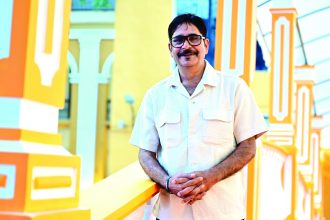Actress Varsha Usgaonkar enters the world of tiatr with ‘Devachem Nanv, Jietam Hanv’ that touches on the themes of family, marriage, land, and mental health
RAMANDEEP KAUR | NT BUZZ
Veteran actress Varsha Usgaonkar, known for her work in Marathi, Hindi, and Konkani films, has stepped onto the tiatr stage with ‘Devachem Nanv, Jietam Hanv’, written, produced, and directed by Mariano Fernandes.
Usgaonkar recalls that the idea of doing a tiatr had been on her mind for quite some time. The opportunity came in March this year when Fernandes approached her with the script. “Around the same time, my dear friend and senior tiatrist Jessie would often say, ‘Varsha, you must do a tiatr’. I had acted in one when I was about 14, but I barely remembered it. So, I always wanted to return to it, because tiatr is such an important part of Goan culture,” she says.
For her, acting in tiatr felt special because it was in Konkani, her mother tongue. “I started my career in theatre and then moved on to films and television, but I’ve always loved being on stage. In 2022 and 2024, I performed in a Marathi play with Prashant Damle and did around 300 shows. After that, this tiatr came at the perfect moment,” she says. “Tiatr has its own rhythm and richness; it has story, song, comedy, and a message.”
Usgaonkar portrays a modern mother and mother-in-law who values family unity, especially in a time when individualism and nuclear families are becoming more common. Her character tries to hold the family together when her daughter-in-law expresses a desire to live separately. “The play also delves into themes of modern relationships and rising divorce rates. My character believes marriage is not just a ritual, it’s a serious commitment that requires work, understanding, and compromise. Today’s generation sometimes overlooks that, but a strong marriage is built over time,” she explains.
One of the scenes involves a prenuptial agreement arranged by her character before her son’s wedding; a move Usgaonkar believes sends a progressive and relevant message. “Mariano’s idea to include that scene was brilliant. It’s not about scaring the couple, but about helping them reflect on the seriousness of marriage. It encourages maturity and shared responsibility from the very beginning. It’s a contemporary concept rooted in traditional values.”
The role also allowed Usgaonkar to showcase her singing and dancing skills. She sings a kantar and performs a Lavani during a Diwali scene. “Singing has always been a passion. I’m not a trained singer, but I’ve nurtured it over the years,” she says.
Her Lavani performance brought a surprising but welcome twist to the stage. “When Mariano asked me to perform a Lavani, I was stunned. I’ve done Lavani in Marathi films, but to bring it to tiatr was a bold idea. I was unsure how the audience would react, but the response was overwhelming. During our first show in Arambol, even the parish priest who watched the play came up to me and said he thoroughly enjoyed the Lavani. The audience, too, has been very warm and welcoming.”
She also performed a solo kantar, a first for her. “I’m used to singing in orchestras with lyrics in front of me, but this time I had to memorise everything. The song, composed by Elick Vaz, was well-received. It talks about the beauty of our mother tongue, and singing it in Konkani made it more special.”
Since its premiere on June 7, ‘Devachem Nanv, Jietam Hanv’ has completed over a dozen shows across Goa, including in Panaji, Margao, Arambol, and Sanvordem. Upcoming shows are scheduled for June 26, 7 p.m. at Gomant Vidya Niketan, Margao, and June 29, 3 p.m. at Kala Academy, Panaji, with more lined up in July. Usgaonkar also hints that international shows may be on the cards.
The ensemble cast includes tiatr veterans like Prince Jacob, Maggie, Meenaxi Chougule, Marcus Vaz, and Prajakta Kavlekar. “I’m the only one from mainstream Marathi and Hindi cinema, but I was blown away by the talent in this group. They are brilliant performers and singers. It’s been a joy working with such a passionate and skilled team,” she says.
However, adjusting to the tiatr format came with its own learning curve. Usgaonkar, who is used to the naturalistic style of acting in Marathi and Hindi theatre, had to adapt to the more expressive and interactive format of tiatr. “Tiatr requires you to speak louder, be more dramatic, and even engage directly with the audience. Initially, I found it tough. I had to push my vocal cords and open up my body language more than usual. Mariano guided me through that process. In tiatr, you sometimes step out of the story and talk to the audience directly. That took some getting used to.”
When asked if she would like to continue doing tiatrs, she replies with enthusiasm, “Definitely. If the subject is meaningful and carries a strong message, I’d love to continue. Tiatr is such a rich format, musical, emotional and entertaining.”
To young Goans who want to act, she has a message. “Today’s youth are lucky to have access to world cinema, IFFI, and many opportunities in local theatre and film. If you want to act, take every opportunity that comes your way, no matter how small the role. It can lead to something bigger. And above all, stay connected to your language and culture. It will take you far.”





